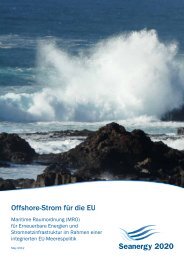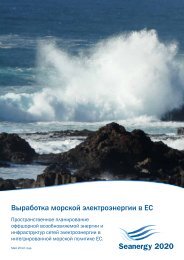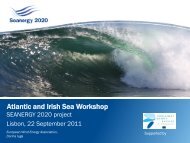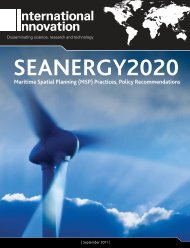Comparative analysis of Maritime Spatial Planning ... - Seanergy 2020
Comparative analysis of Maritime Spatial Planning ... - Seanergy 2020
Comparative analysis of Maritime Spatial Planning ... - Seanergy 2020
You also want an ePaper? Increase the reach of your titles
YUMPU automatically turns print PDFs into web optimized ePapers that Google loves.
In Denmark, the Integrated Marine Strategy lays down a comprehensive governmental action tooptimise and coordinate current regulation in maritime zones. In terms <strong>of</strong> zoning for <strong>of</strong>fshore winddevelopment, 23 possible locations for future <strong>of</strong>fshore wind locations have been identified but arenot yet approved by the government.In its <strong>Maritime</strong> <strong>Spatial</strong> Plan (2009) for the North Sea, Germany defined priority areas for <strong>of</strong>fshorewind energy use in its EEZ. The competence for MSP in the territorial sea is left to the regionalauthorities (Länder). Even though this decision can be interpreted as dividing federal and regionalcompetences, however, it has the advantage <strong>of</strong> local governance in the territorial seas. Localdecision-makers also appear to invest in careful consultation <strong>of</strong> local stakeholders. Also, localauthorities reportedly develop a better understanding <strong>of</strong> possible sector conflicts. Decentralisedgovernance <strong>of</strong>ten seems to result in larger local support and wider acceptance <strong>of</strong> ORE developmentin the territorial seas.The Netherlands have agreed in December 2010 an overall policy framework for MSP in theirmaritime zones, called the National Water Plan. This plan contains 2 main <strong>of</strong>fshore wind energyareas (OWE), and also defines two large search areas.The criteria based MSP policy for ORE development in the UK leaves, in theory, all spatial optionsopen, as long as a series <strong>of</strong> MSP criteria are respected.4.1.3 Policy recommendationsMSP policies and legal frameworks are in general well developed in the North Sea basin, so policyrecommendations may seem rather superfluous in this EU maritime zone. However, even goodpractices can always benefit from „better and best‟ practices:• Ensure best possible legal certainty <strong>of</strong> ORE development though comprehensive MSP primarylegislation. The most integrated MSP policy related to ORE development has recently beenestablished in the Netherlands where a National Water policy defines 2 categories <strong>of</strong> ORE zones.Anchoring ORE preferential zoning to a comprehensive primary MSP legislation seems to <strong>of</strong>ferthe best possible legal certainty for ORE development, at least from a siting point <strong>of</strong> view 52 ,• Ensure local and public sectorial support, for the development <strong>of</strong> MSP policy related to ORE interritorial zones in the North Sea. Without this support, legal actions against ORE in the territorialseas can be expected. That is why the German practice <strong>of</strong> delegating the decision makingprocess for ORE development in the territorial seas to the local authorities (Länder) is interestingand can be an example to inspire ORE related MSP for the territorial seas in the Mediterranean.52 The most important drivers for ORE development remain RE support schemes and grid connection,Deliverable D 2.380 | P a g e






